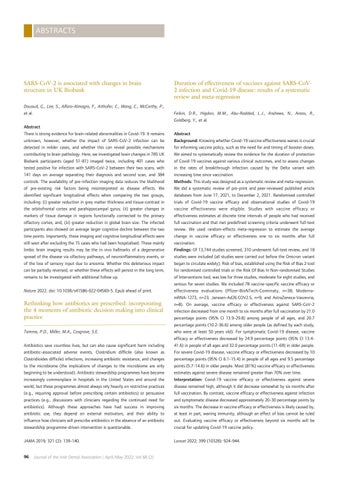JIDA_AprilMay_2022(Mel)_V3.qxp_JIDA 14/04/2022 17:13 Page 96
ABSTRACTS
SARS-CoV-2 is associated with changes in brain structure in UK Biobank Douaud, G., Lee, S., Alfaro-Almagro, F., Arthofer, C., Wang, C., McCarthy, P., et al. Abstract There is strong evidence for brain-related abnormalities in Covid-19. It remains unknown, however, whether the impact of SARS-CoV-2 infection can be detected in milder cases, and whether this can reveal possible mechanisms contributing to brain pathology. Here, we investigated brain changes in 785 UK Biobank participants (aged 51-81) imaged twice, including 401 cases who tested positive for infection with SARS-CoV-2 between their two scans, with 141 days on average separating their diagnosis and second scan, and 384 controls. The availability of pre-infection imaging data reduces the likelihood of pre-existing risk factors being misinterpreted as disease effects. We identified significant longitudinal effects when comparing the two groups, including: (i) greater reduction in grey matter thickness and tissue-contrast in the orbitofrontal cortex and parahippocampal gyrus; (ii) greater changes in markers of tissue damage in regions functionally connected to the primary olfactory cortex; and, (iii) greater reduction in global brain size. The infected participants also showed on average larger cognitive decline between the two time points. Importantly, these imaging and cognitive longitudinal effects were still seen after excluding the 15 cases who had been hospitalised. These mainly limbic brain imaging results may be the in vivo hallmarks of a degenerative spread of the disease via olfactory pathways, of neuroinflammatory events, or of the loss of sensory input due to anosmia. Whether this deleterious impact can be partially reversed, or whether these effects will persist in the long term, remains to be investigated with additional follow up.
Duration of effectiveness of vaccines against SARS-CoV2 infection and Covid-19 disease: results of a systematic review and meta-regression Feikin, D.R., Higdon, M.M., Abu-Raddad, L.J., Andrews, N., Araos, R., Goldberg, Y., et al. Abstract Background: Knowing whether Covid-19 vaccine effectiveness wanes is crucial for informing vaccine policy, such as the need for and timing of booster doses. We aimed to systematically review the evidence for the duration of protection of Covid-19 vaccines against various clinical outcomes, and to assess changes in the rates of breakthrough infection caused by the Delta variant with increasing time since vaccination. Methods: This study was designed as a systematic review and meta-regression. We did a systematic review of pre-print and peer-reviewed published article databases from June 17, 2021, to December 2, 2021. Randomised controlled
Antibiotics save countless lives, but can also cause significant harm including antibiotic-associated adverse events, Clostridium difficile (also known as Clostridioides difficile) infections, increasing antibiotic resistance, and changes to the microbiome (the implications of changes to the microbiome are only beginning to be understood). Antibiotic stewardship programmes have become increasingly commonplace in hospitals in the United States and around the world, but these programmes almost always rely heavily on restrictive practices (e.g., requiring approval before prescribing certain antibiotics) or persuasive practices (e.g., discussions with clinicians regarding the continued need for antibiotics). Although these approaches have had success in improving antibiotic use, they depend on external motivators, and their ability to
trials of Covid-19 vaccine efficacy and observational studies of Covid-19 vaccine effectiveness were eligible. Studies with vaccine efficacy or effectiveness estimates at discrete time intervals of people who had received full vaccination and that met predefined screening criteria underwent full-text review. We used random-effects meta-regression to estimate the average change in vaccine efficacy or effectiveness one to six months after full vaccination. Findings: Of 13,744 studies screened, 310 underwent full-text review, and 18 studies were included (all studies were carried out before the Omicron variant began to circulate widely). Risk of bias, established using the Risk of Bias 2 tool for randomised controlled trials or the Risk Of Bias In Non-randomised Studies of Interventions tool, was low for three studies, moderate for eight studies, and serious for seven studies. We included 78 vaccine-specific vaccine efficacy or effectiveness evaluations (Pfizer-BioNTech-Comirnaty, n=38; ModernamRNA-1273, n=23; Janssen-Ad26.COV2.S, n=9; and AstraZeneca-Vaxzevria, n=8). On average, vaccine efficacy or effectiveness against SARS-CoV-2 infection decreased from one month to six months after full vaccination by 21.0 percentage points (95% CI 13.9-29.8) among people of all ages, and 20.7 percentage points (10.2-36.6) among older people (as defined by each study, who were at least 50 years old). For symptomatic Covid-19 disease, vaccine efficacy or effectiveness decreased by 24.9 percentage points (95% CI 13.441.6) in people of all ages and 32.0 percentage points (11-69) in older people. For severe Covid-19 disease, vaccine efficacy or effectiveness decreased by 10 percentage points (95% CI 6.1-15.4) in people of all ages and 9.5 percentage points (5.7-14.6) in older people. Most (81%) vaccine efficacy or effectiveness estimates against severe disease remained greater than 70% over time. Interpretation: Covid-19 vaccine efficacy or effectiveness against severe disease remained high, although it did decrease somewhat by six months after full vaccination. By contrast, vaccine efficacy or effectiveness against infection and symptomatic disease decreased approximately 20-30 percentage points by six months. The decrease in vaccine efficacy or effectiveness is likely caused by, at least in part, waning immunity, although an effect of bias cannot be ruled
influence how clinicians will prescribe antibiotics in the absence of an antibiotic stewardship programme-driven intervention is questionable.
out. Evaluating vaccine efficacy or effectiveness beyond six months will be crucial for updating Covid-19 vaccine policy.
JAMA 2019; 321 (2): 139-140.
Lancet 2022; 399 (10328): 924-944.
Nature 2022. doi: 10.1038/s41586-022-04569-5. Epub ahead of print.
Rethinking how antibiotics are prescribed: incorporating the 4 moments of antibiotic decision making into clinical practice Tamma, P.D., Miller, M.A., Cosgrove, S.E.
96
Journal of the Irish Dental Association | April/May 2022: Vol 68 (2)
